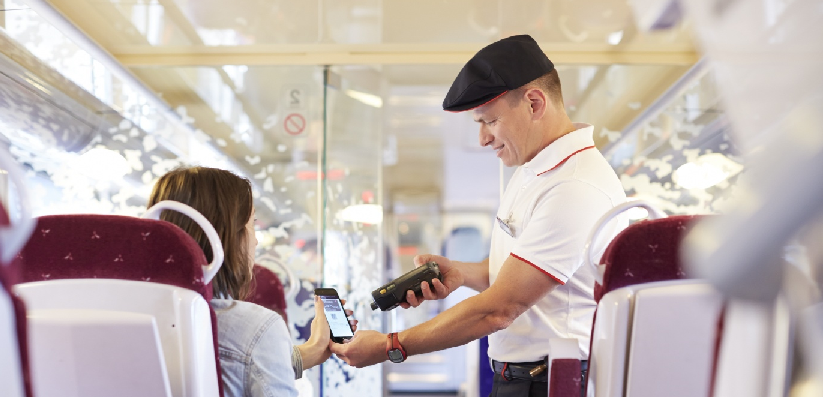FP2-R2DATO D7.3: Perform simulation with initial implementation of the Data Factory The FP2 R2DATO project advances...


Image: SNCF
Shift2Rail is contributing to the development of transportation as a service, also known as ‘Mobility-as-a-Service’, a new concept of mobility: A shift from a piecemeal ‘individual transport modes’ approach towards a world of ‘solutions’ provided and consumed as a service.
The ecosystem Shift2Rail is building will be an absolute revolution for intermodal transport. Passengers will be able to book from their devices, and with a single click, multimodal trips for both short and long distance trips across Europe. No more need to enter four or five different reservation systems every time we book a trip.
To enable this, Shift2Rail IP4 researchers are building a digital ecosystem where all public and private transport operators in Europe will be able to offer their services. The system will then combine different travel segments to offer intermodal packages, customised to clients’ preferences.
Today, apps allow checking what the best multimodal route is. But Shift2Rail IP4 will take this to a whole new level: it will offer live-traffic notifications based on predictive models fed by information received directly from the rail assets and it will propose automatic alternatives on the go should a disruption come up.
The Shift2Rail MaaS ecosystem, built on IP4 technologies, will take all available transport modes into account: ‘traditional’ public transport, such as trains, trams, metros, buses and taxis, ‘new modes’ such as bike-, car- and ride-sharing services and also autonomous cars. A single application would offer all the possible options for a trip, with prices and trip length clearly displayed, so that travellers can book their preferred itinerary effortlessly.
MaaS is a concept of mobility bound to be driven by digitalisation –a step forward not only for the travellers but also for logistics.
Building a whole new transport ecosystem for you
Shift2Rail concept towards offering ‘MaaS’ is building the ‘Interoperability Framework’ (IF), a system able to retrieve information on services from travel providers across modes. Using semantic technology, the IF can organise data from different parties, sort, compile and make it available to passengers through the Shift2Rail IP4 ecosystem.
A prototype for this system has already been developed in early Shift2Rail projects. Research will now focus on improving the system’s performance and scalability to foster its wide deployment. Researchers will simplify all the necessary steps to integrate new services and will provide relevant scenarios to support ‘MaaS’ projects.
For passengers to access the offer of multi-modal trips, Shift2Rail projects are developing the ‘travel companion’ demonstrator, a platform that allows travellers to fully control their multimodal journeys, easily book inter-modal tickets and modify their trip itineraries if needed. It also gives access to travel services such as ordering meals and buying items on-board. Travellers will be able to customise this application so that they get offers adapted to their preferences.
An essential feature of the ‘travel companion’ is the ‘trip-tracker’ demonstrator, a tool able to provide personalised real-time information to passengers about their multimodal journey. The software is able to predict possible service disruptions and offer the best alternatives based on real-time traffic information.
Shift2Rail projects will present a ‘travel companion’ demonstrator at InnoTrans, the largest international trade fair for rail transport technology, taking place in Berlin on 18-21 September.
The prototype allows fast multi-modal ticket booking, journey live-tracking, offering alternatives in case of disruptions, and other features such as location-based experiences and a built-in wallet where passengers can store their virtual tickets —radically simplifying travellers’ lives.
MaaS concept delivered by Shift2Rail partners: much more than ‘just’ IT
Challenges for MaaS go further than building an IT environment. To truly deliver MaaS, Shift2Rail partners across Europe engage in unprecedented collaboration efforts.
Legal agreements among travel operators will lay behind the ecosystem, defining each company’s liabilities when a user buys an inter-modal ticket. Questions such as how to distribute the fares from an integrated ticket or who holds responsibility in case of a disruption need to be settled before making intermodal trips available.
The next asset management system developed within Shift2Rail will also contribute to smoother multi-modal travelling. It incorporates, for example, predictive models integrated with measured operational data from the infrastructure assets, able to deliver higher timetable punctuality rates and to predict disruptions in case of maintenance needs. The ‘trip tracker’ demonstrator functionality would report this information to passengers’ smartphones so that they can easily adapt their journey if needed.
Train stations with enhanced crowd management, accessibility to trains from the platform and improved station designs and components, all in development within the Shift2Rail programme, will help too. The ‘trip tracker’ will consider these elements in its travel offers, enabling a more comfortable, more accessible, and safer mobility experience for passengers reaching the railway station of the future.
Implementing the ‘Mobility as a Service’ with the Shift2Rail IP4 ecosystem concept would radically change the way we move in Europe, making railways and public transport at large more attractive to citizens. Ultimately, this could help increase the use of public transport, reducing greenhouse gas and particle emissions and road congestion.